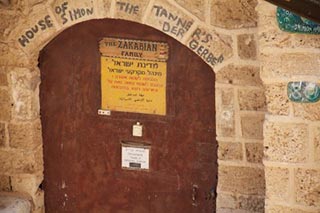10:1–8 This chapter marks a breakthrough in the church’s mission to the Gentiles (non-Jewish people). The conversion of Cornelius, a Roman centurion, indicates to the church that God fully accepts Gentiles into God’s people without the necessity of conforming to Jewish Law. |
10:1 Caesarea See note on Acts 8:40.
Italian Cohort This group may have been an auxiliary Roman force in Palestine consisting of Italian volunteers rather than local mercenaries or draftees.
10:2 devout and fearing God This is Luke’s designation for Gentiles (non-Jewish people) who worshiped the God of Israel (e.g., vv. 22; 13:26; 18:7). Cornelius was not Jewish and may not have been a full convert—in the sense of abiding by Jewish food practices and circumcision (compare vv. 28–29, 45)—but he was a worshiper of Yahweh.
 Cornelius’ Conversion and the Mission to the Gentiles
Cornelius’ Conversion and the Mission to the Gentiles
10:3 a vision The Greek word used here always refers in Acts to experiencing something supernatural (e.g., 9:10; 12:9; 16:9; 18:9).
10:4 memorial offering This suggests either that Cornelius’ prayers are a remembrance of God’s goodness toward him, or more likely, that in response to Cornelius’ prayers God is about to remember him—that is, to act on his behalf (compare Psa 141:2).
10:6 whose house is by the sea The Lord provides the location of the house to ensure Cornelius or his messengers quickly find it.
10:7 devout This term implies the soldier also worshiped the true God, Yahweh (see note on Acts 10:2).
10:9–24 God gives Peter a vision that prepares him for the arrival of the messengers from Cornelius (vv. 7–8). The vision’s meaning and ot allusions reinforce the universal cultural scope of the Church’s message and mission. |
10:9 sixth hour At this time Peter would have been hungry and waiting for his midday meal to be ready (v. 10), an appropriate time for a vision involving food.
10:11 heaven opened Compare Ezek 1:1; Rev 19:11.
10:12 animals Luke, the narrator, probably intends to convey that virtually every sort of creature was present.
10:14 common and unclean Some of the creatures the Lord tells Peter to eat would have been forbidden for a Jew to eat, and others would have been acceptable.
10:15 made clean Compare Acts 15:9.
10:16 three times Just as Peter had denied Jesus three times (Luke 22:34), here he refuses to obey three times.
10:19 the Spirit The Spirit helps Peter to understand the vision by acting on it instead of merely continuing to contemplate it.
10:20 not hesitating See note on Acts 11:12.
I have sent them The Spirit has not only sent the apostles to the Gentiles, but He has sent the Gentiles to the apostles.
10:23 entertained them as guests Peter abides by the vision’s message. Ancient Near Eastern hospitality would have required that Peter offer food to his guests.
10:25–43 This passage describes the culmination of Cornelius’ and Peter’s visions, leading to the full incorporation of a large group of non-Jewish people (Gentiles) into the Christian community. |
10:25 worshiped Cornelius’ actions—kneeling to the ground and paying homage—demonstrate his respect for Peter.
10:26 also a man Describes Peter’s refusal to be considered superior to Cornelius (compare 14:15).
10:28 forbidden While no specific ot law forbade interaction with non-Jewish people (Gentiles), the purity laws often meant Jews limited interaction with Gentiles in order to remain ritually pure.
common or unclean Peter’s presence in Cornelius’ home with the many Gentiles gathered there shows that he finally realizes the full implication of his vision (see note on v. 14).
10:34 one who shows partiality Peter realizes that God does not exclude people from joining his people (compare Isa 2:1–5). Salvation in Jesus is not based on ethnicity or culture but is an offer to all.
10:35 acceptable Peter acknowledges that faith and a transformed life, not ethnicity or keeping the ot laws, authenticates a person as one of God’s own. Peter is about to explain how salvation in Jesus makes this possible (Acts 10:36–43).
10:36 Lord of all Peter emphasizes certain details of the gospel message that specifically relate to God’s plans for non-Jewish people. Foremost is the theology that Jesus’ lordship extends over all; He is not a cultural or national king, but the true king for everyone in the world.
10:37 you know Peter assumes those present are familiar with Jesus’ earthly ministry, perhaps because the broad outlines of the events were widely known (compare 2:22), or because Cornelius and his family believed in Yahweh and would keep informed of Jewish religious developments (see v. 2 and note).
10:38–40 Peter’s summary here of Jesus’ identity, ministry, crucifixion, and resurrection is similar to the one he provides in his Pentecost sermon (2:22–24). |
10:39 hanging him on a tree The Greek text here seems to allude to Deut 21:22–23, which says that anyone who is executed by hanging on a tree is cursed by God. The implication is that, by taking on Himself God’s curse on the cross, Jesus satisfied the penalty of the law on behalf of all who will put their faith in Him (see Gal 3:13–14; compare Isa 53:5; Zech 12:10).
10:41 ate and drank Peter stresses the bodily nature of Jesus’ resurrection (compare John 21:1–19).
10:42 judge of the living and of the dead Jesus is the one to whom all will give account on the day of judgment (see Acts 17:31; 2 Tim 4:1; 1 Pet 4:5; Rev 20).
10:43 all the prophets Peter argues that his brief synopsis of Christ’s ministry and its implications are based on the ot (compare Psa 22:1–31; Isa 52:13–53:12; Zech 11:4–14).
 Jesus’ Fulfillment of Old Testament Prophecy Table
Jesus’ Fulfillment of Old Testament Prophecy Table
through his name See note on Acts 3:6.
10:44–48 The Holy Spirit’s dramatic induction of Cornelius’ Gentile household into the Christian community echoes Pentecost and emphasizes that non-Jews are full citizens of the kingdom of God by faith. |
10:46 speaking in tongues This expression of the Spirit’s indwelling and power echoes the initial events of Pentecost (2:3–4). However, the expression here seems more likely related to worship (see note on 1 Cor 13:1), since there is no need for Cornelius and those with him to speak a human language that would have been otherwise unknown to them (see 1 Cor 14:1–25).
10:47 to be baptized The baptism of these believers before representatives of the Jewish Christian community signifies not only their identification with Christ but their full incorporation into the Church without being required to adopt the regulations of Judaism.

|
About Faithlife Study BibleFaithlife Study Bible (FSB) is your guide to the ancient world of the Old and New Testaments, with study notes and articles that draw from a wide range of academic research. FSB helps you learn how to think about interpretation methods and issues so that you can gain a deeper understanding of the text. |
| Copyright |
Copyright 2012 Logos Bible Software. |
| Support Info | fsb |
 Loading…
Loading…


